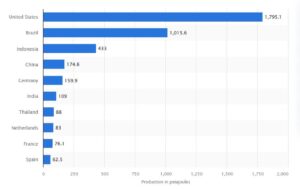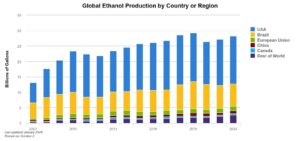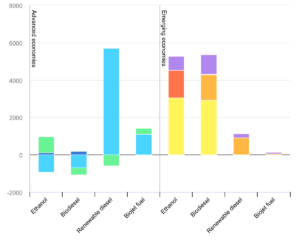The Brazilian Bioenergy Market
See data on the bioenergy market in Brazil, what the country’s potential is in biofuel production, short-term challenges and more.
Brazil is one of the largest producers of ethanol and biodiesel in the world and is a leader in the bioenergy market. The country stands out as the world’s largest producer of sugarcane and soybeans, the main feedstocks for biofuel production in Brazil. Sugarcane is widely used to produce ethanol, while soy is the main source of biodiesel.
In addition to being a major producer, Brazil is also one of the largest consumers of biofuels. According to the International Energy Agency (IEA), most of the new demand for this type of energy is coming from emerging markets, particularly Brazil, Indonesia and India. Take a closer look at the country’s energy matrix, production figures, future potential, and more. Read on!
See data on Brazil’s bioenergy market
According to the Ministry of Mines and Energy’s 2023 Energy Balance, renewable sources accounted for 87.9% of Brazil’s energy matrix in 2022, with hydropower accounting for 61.9% of that total. By 2023, electricity generation from biomass will account for about 8% of the country’s total electricity production.
In the biofuels sector, Brazil is the second largest producer in the world, after the United States. The North American country will reach 1,795 petajoules in 2023, while the Latin American country will reach 1,016 petajoules in the same year. Both countries have a virtually isolated position at the top of production. See below:

Source: Statista
In Brazil, biofuel production reached an all-time high in 2023, with growth and diversification of renewable sources. According to the Brazilian Secretariat of Social Communication, ethanol and biodiesel totaled nearly 43 billion liters – 35.4 billion liters of ethanol and 7.5 billion liters of biodiesel.
The data confirms that ethanol is Brazil’s main biofuel and is responsible for positioning the country as a leader in the global bioenergy market. According to the U.S. Department of Energy, the two countries together produce 80% of the world’s ethanol supply. See the chart below:
World Ethanol Production by Country:

Source: Energy.gov
Read also:
- The development of the bioenergy market in Asia
Brazil’s potential for the future of bioenergy
Both biofuels and bioelectricity have high growth potential due to global renewable energy targets. Brazil is one of the countries with the greatest potential for development in this market, and the numbers already support this imminent rise.
The International Energy Agency has published data on the growth in global demand for biofuels between 2022 and 2024. Brazil, the United States and Europe are the main markets that have developed in the last two years. See the graph:

Source: IEA
According to the institution, demand for biofuels is expected to grow by 23% to 200 billion liters by 2028. The data shows that renewable diesel and ethanol will account for two-thirds of this growth, and Brazil will play a key role in supplying this advance.
Also read:
- The role of cooperatives in the development of the Brazilian agricultural market
The future of SAF in the Brazilian bioenergy market
SAF (Sustainable Aviation Fuel) is a sustainable aviation fuel produced from biomass. Like ethanol and biodiesel, SAF is expected to gain importance in Brazil due to its high production potential.
The president of the Brazilian Airline Association (ABEAR) says that the country is an established name in the bioenergy market and can use this position to become a major exporter of SAF in the future. According to ABEAR, Brazil has the raw material potential to become self-sufficient in SAF production and still export 1.8 billion liters.
A number of measures are being implemented in Brazil to strengthen the domestic bioenergy market. The National Program for Sustainable Aviation Fuel (ProBioQAV) aims to promote the production and use of SAF in the country with structured targets until 2037. Under the new policy, airlines will be required to reduce carbon dioxide emissions by 1% from 2027, reaching a 10% reduction in 10 years.
Petrobrás itself, a Brazilian company active in the oil, natural gas and energy industries, has announced that it will work on the production of SAF in two refineries. The units will come online starting in 2028, and will further increase SAF production.
Read also:
- Understanding the Importance of Logistics in Agribusiness
Challenges for the Future of Brazilian Bioenergy
In the short term, Brazil’s main challenge in the bioenergy market is to stimulate domestic demand and technological progress. The country needs to step up its search for ethanol and biodiesel to meet all future demand. There is also a need to reduce costs in the production process in order to control the final price at the pump.
Currently, ethanol production in Brazil is mainly based on sugar cane, which is also used to produce sugar. Since both productions share the same raw material, sugarcane plantations are often directed to the sector that offers the greatest profitability, directly affecting supply and prices in competing markets.
This imbalance has contributed to the recent rise in ethanol prices in Brazil. As prices have risen, domestic demand for the biofuel has fallen. To address this situation, the Brazilian government has adopted measures to promote the use of ethanol and biodiesel, such as gradually increasing the mandatory biofuel blend to 15% by 2026. In addition, the industry has been exploring alternatives such as the use of corn and organic waste in ethanol production.
Recently, the proposed constitutional amendment (PEC) entitled “Fuels of the Future” was approved and represents a significant milestone in Brazil’s energy transition. The PEC aims to promote the development and use of cleaner and more sustainable energy sources, such as advanced biofuels, green hydrogen and renewable electricity.
By promoting technological innovation and the necessary infrastructure for the production and distribution of these fuels, the PEC aims to reduce dependence on fossil fuels, reduce greenhouse gas emissions and promote the green economy. With this initiative, Brazil is positioning itself at the forefront of energy sustainability, aligning itself with global goals to combat climate change and promote a cleaner and more sustainable future for future generations.
The role of hedging in Brazil’s bioenergy market
In an emerging market such as bioenergy, hedging is essential to mitigate the financial risks associated with market volatility. By using advanced tools, bioenergy companies in Brazil and around the world can plan their operations with greater certainty and protect themselves from potential price fluctuations.
Contact Hedgepoint to learn more about these hedging products.






